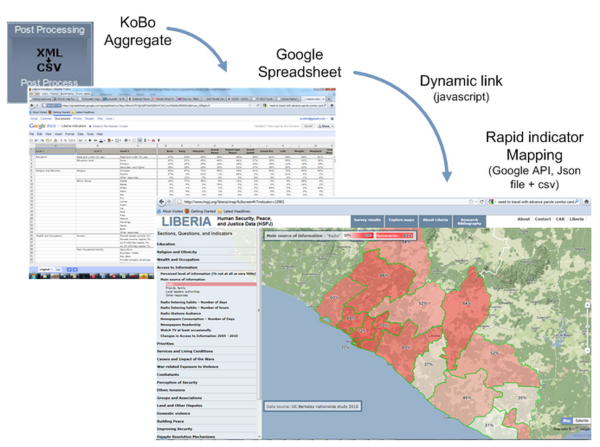Humanitarian initiatives are spearheading innovation and organizations large and small stand to benefit. As a whole the digital revolution has impacted the way we communicate and share information with each other, but it’s also shaping the way we collect data and what we do with that data. More and more companies are shifting to mobile-based data collection – it’s faster, cheaper, more efficient, and it also enhances the quality of data gathered. Here’s why:
- Efficiency: Mobile data collection and data entry can be performed simultaneously. This reduces the amount of personnel required to collect information as well as the time it takes to complete the task.
- Improved Data Quality: With answer validation checks built into mobile infrastructure, data cleaning is already underway.
- Better Insight: Data can be interpreted in real-time as it's uploaded. This enables trend spotting with visualization tools, including maps and graphs, which illustrate more accurate portrayals of a situation or environment. Mobile technology also ensures "anytime, anywhere" access to field-level data.
- Data Security: Mobile data is collected via encrypted forms and sent to secure online databases ensuring information is securely stored and easily accessible.
Mobile data collection isn’t just helping companies be more efficient; it’s also helping people respond better to humanitarian crisis. One company taking an innovative approach to using mobile data collection in transformative ways is KoBo Toolbox, a Harvard Humanitarian Initiative. KoBo Toolbox is an integrated suite of applications for handheld digital data collection that enhance the speed and accuracy of collecting and sharing information in emergency or conflict environments.
KoBo Toolbox was born out of necessity. Almost 10 years ago KoBo Toolbox co-founders Patrick Vinck and Phuong Pham worked in Iraq, Eastern Congo, and Central African countries to assess how these populations were affected by conflict. After spending countless hours on projects in developing countries, Vinck realized that he had a problem. His biggest challenge was how to gather accurate data on crisis situations efficiently. Using traditional methods, not only would it take over one year to gather all of the results, but by the time data was collected most of the information was already outdated. Seeking a more convenient way to gather and share information, Vinck and Pham turned to mobile. However, since most of their research teams worked in remote locations with limited Internet service, they needed a dynamic mobile platform that worked well even when the Internet wasn’t accessible. After much trial and error, the duo finally adopted Android’s open data kit, and KoBo Toolbox was born.
The resulting suite of apps help gather and share data more effectively, leading to the greater ability to understand and quickly respond to humanitarian crisis. KoBoMap (currently in development) is one example. KoBoMap is designed to geographically portray data, an incredibly useful tool that was previously only available to national or sub-national organizations.

Kobo Map, one of Kobo Toolbox's Mobile Data Collection Apps
All of KoBo Toolbox’s developers work with Vinck and Pham in the field. This ensures that there’s no disconnect between the product and its users. Additionally, KoBo Toolbox operates on an open-source platform, which means it’s free to use and is highly customizable. It works well with limited Internet, utilizes remote administration, and can be used on multiple devices. KoBo Toolbox forms can also be encrypted to protect sensitive data.

The Kobo Toolbox Suite
KoBo Toolbox was made public three years ago and has been widely adopted by humanitarian initiatives. The apps enable organizations to land in conflict and emergency zones and successfully gather pertinent information in 24-48 hours. In fact, organizations like the International Rescue Committee reached out to the KoBo team and requested that the app be tailored to human applications.
In addition to case studies in Kenya, India, and Liberia, the International Organization for Migration recently used KoBo Toolbox following the large typhoon in the Philippines. Teams were deployed on the ground almost immediately and they were already equipped with statistics regarding which areas had access to clean water and available shelters. The John D. and Catherine MacArthur Foundation was among the first organizations to believe in Kobo Toolbox and further fund its development. So far this suite of apps is supported by the United Nations, US Aid, and Humanity United. And following a $100,000 grant from Google’s Executive Chairman Eric Schmidt, the KoBo team looks forward to releasing a more intuitive and stable version of KoBo Toolbox.
Humanitarian initiatives have most quickly adopted the idea of KoBo Toolbox and digital data collection. However, the potential in mobile data collection extends beyond the humanitarian field, with many applications for enterprise. Mobile data collection tools can be employed in commodity tracking, monitoring and evaluation (M&E), as well as conducting research. By improving the quality and accuracy of data, organizations everywhere stand to benefit.
Vinck and Pham hope to see widespread adoption of KoBo Toolbox by NGOs. Whereas many humanitarian-focused initiatives paint compelling narratives based on pictures, the KoBo team believes in incorporating hard data to depict stories. Vinck and Pham believe the tool’s ability to incorporate quantitative and qualitative data in recounting stories of humanitarian crisis will positively impact millions of people around the world.
